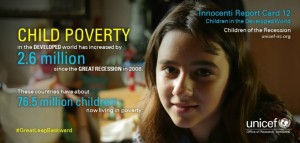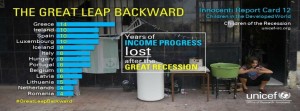
By Ann Marie Foley - 30 October, 2014

The number of children in poverty has increased by more than 130,000 in Ireland in four years according to a new UNICEF report.
The report shows that the child poverty rate in Ireland (measured by Eurostat) rose from 18% to 28.6% between 2008 and 2012, an increase of 10.6%.
By comparison poverty among older people has increased by 2.5% during the same period.
“Countries should place the well-being of children at the top of their priorities during economic recessions. Not only is this a moral obligation, but it is in the long term self-interest of societies,” Peter Power, Executive Director of UNICEF Ireland, said.
He added, “Children living in poverty are more likely to become impoverished adults and have poor children, creating and sustaining intergenerational cycles of poverty.”
UNICEF’s 12th Report Card titled, Children of the Recession: The impact of the economic crisis on child well-being in rich countries, ranks 41 countries in the OECD and the EU according to whether levels of child poverty have increased or decreased since 2008.
Ireland ranks 37 of 41 OECD countries, ahead of Croatia, Latvia, Greece and Iceland in the league table measuring relative changes in child poverty.
“Yesterday’s UNICEF report reveals shocking and frankly shameful data for Ireland. We knew that during the recession the number of children living in poverty increased, but this report shows just how huge a step backwards we have taken,” commented Fergus Finlay, CEO of Barnardos.
Other findings show the recession hit 15-24 year olds especially hard. Ireland ranks 14 out of 41 countries in a league table measuring the change in NEET which refers to young people who are “Not in Education, Employment or Training”.
The report also highlighted a Gallup poll surveying people’s perceptions of how their lives have changed.
Irish families are experiencing additional stress and have a lower overall satisfaction with life. The data further shows that people do not believe children in Ireland have the opportunity to learn and grow every day.
“We cannot but heed this latest dire warning. Decisive steps to reverse this trend must be taken as quickly as possible. We must build on the Budget 2015 pledges and invest in public services that benefit children, in particular health services. We must improve access to quality early childhood care and education and continue to invest in child benefit as a universal payment (alongside robust public services) proven to be best approach to tackle child poverty,” stated Fergus Finlay in a letter to the Irish Times.
He cautioned that poor children grow up in poor families and by breaking this cycle by investing in children is not only better for them but the economy and wider society too.
Overall UNICEF’s report shows that 2.6 million children have sunk below the poverty line in the world’s most affluent countries since 2008, bringing the total number of children in the developed world living in poverty to an estimated 76.5 million.
18 OECD countries recorded a reduction in child poverty during the same period, including Chile, Australia and Poland, which saw a reduction of 7.9%.
In 24 out of 31 countries, poverty levels have decreased among older people while among children they have increased in 20 countries, suggesting that safeguards for older people have been more effective than those for children and young people.

Under the report heading ‘The consequences of the great leap backwards’ it states that Greek families lost the equivalent of 14 years of income progress while Ireland, Luxembourg and Spain lost a full decade, and four other countries lost almost as much.
The recession has brought suffering and life-long risks to an extra 2 million children in Mexico, 1.7 million in the United States, and 619,000 in Italy and 444,000 in France.
It may take years for many families and children years to return to pre-crisis levels of well-being.